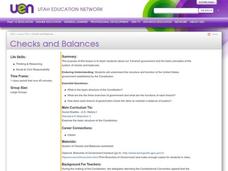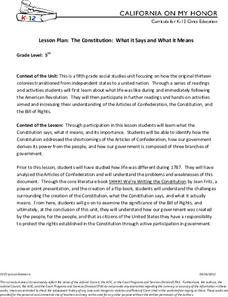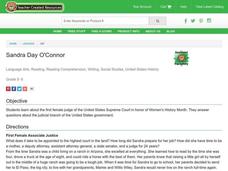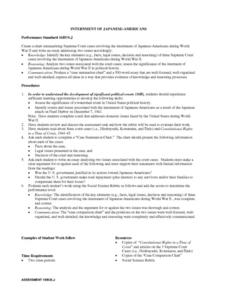Curated OER
Citizens of the Future
Young sociologists explore how local, state, and federal governments work. This very impressive and ambitious lesson requires pupils to contact government officials who represent them and their families. They research elections, and hold...
Curated OER
Checks and Balances
Eleventh graders explain the structure and function of the United States government established by the Constitution. They set up a make-believe scenario: the 3 volunteers have been friends for a long time and have formed a club (the...
Curated OER
Utah's Judicial Branch
Seventh graders explain that the judicial branch of Utah's government interprets laws and reviews the consitutionality of laws.
Curated OER
Twelve Angry Men: Trial by Jury as a Right and as a Political Institution
Students explore the constitutional guarantee of the right to trial by jury. In this U. S. Constitution instructional activity, students read or view Twelve Angry Men and respond to discussion questions regarding the jury. Students...
Heritage Foundation
Courts and Judges
If the Supreme Court is so supreme, why do all cases not just start there? High schoolers learn why every case does not start at the Supreme Court as well as the importance of hierarchy in the US judicial system in the 11th installment...
State Bar of Texas
Marbury v. Madison
Who has the final say in matters dealing with the rules under the United States Constitution? The case Marbury v. Madison brings to light the issue of judicial review. Learners investigate the Supreme Court's opinion in the case with a...
Judicial Branch of California
The Constitution: What It Says and What It Means
Learners get the chance to act as representatives to the Constitution Convention, and must decide whether or not to recommend your state ratify the new framework. After examining the Constitution line-by-line, they consider their...
Curated OER
Building the Foundation
Students understand the purpose of the judicial branch of government. In this judiciary lesson, students participate in exercises to understand how the court system works. Students complete activity sheets to develop understanding of...
Curated OER
Three Branches of Government+++A Visual Representation
Third graders identify the three branches of government, describing their functions, and the important people in each branch. They construct models of the buildings and people to visually represent the Legislative, Executive, and...
Curated OER
You and the Judicial System
High schoolers explore how the structure of the state and federal judicial systems affect them. They select an appropriate media and create a presentation on the structure of the judicial system, the criminal judicial system and a guide...
Delegation of the European Union to the United States
Structure of Government within the EU
The political system of the European Union is historically unique and has been constantly evolving. To better understand the structure of the EU, class members compare the EU's branches to those of the United States Federal Government.
Administrative Office of the US Courts
Nomination Process
"I do solemnly swear that I will support and defend the Constitution of the United States..." Scholars investigate the nomination process of Supreme Court justices when assuming office. Through examination of primary and secondary...
Curated OER
Functions of the Three Branches of Government
Learners research the branches of government and write summaries about both the state and federal systems. After conducting reaserch in texts and online, students create Venn diagrams displaying the governmental functions of the three...
Curated OER
Sandra Day O'Connor
No unit on important women in history would be complete without a activity on Sandra Day O'Connor. After reading background information about the first female Supreme Court justice, middle schoolers engage in several activities...
School Improvement in Maryland
Building a Pyramid
After reviewing the structure and powers of the three branches of the US government, groups investigate a problem and research what is being done to address this criticism.
Curated OER
Landmark Supreme Court Cases And The Constitution
Have an engaging class discussion on the Bill of Rights, U.S. Constitution, and the Supreme Court. Learners examine multiple aspects of the Marbury v. Madison case and the impact that case had on the judicial system in the U.S. Web...
C-SPAN
Presidential Veto and Congressional Override
One of the key powers of the executive branch is the president's ability to pass or veto legislation proposed by Congress. Congress, the legislative branch, on the other hand, can override a president's veto. Five film clips show how the...
iCivics
Separation of Powers
In a fun and informative simulation, your learners will act in groups as lead chefs, menu writers, and nutrition inspectors in deciding a new school lunch menu. They will then compare and contrast their experience to the interaction...
Curated OER
Woodrow The White House Mouse
Inauguration Day is January 20. Implement an entire week's worth of mini activities to help young historians become knowledgeable of the President's job, the executive branch, and the White House. The worksheets focus on research skills,...
School Improvement in Maryland
Dividing the Powers of Government
Who does what? To develop an understanding of the balance of power between the US federal and state governments, class members research responsibilities in terms of legal systems, security issues, economic activities, lawmaking, and...
Curated OER
Internment of Japanese-Americans
Students assess the significance of a watershed event in the political history of the United States . They identify events and issues associated with the internment of Japanese-Americans as a result of the Japanese attack on Pearl Harbor...
Curated OER
What is Due Process Anyway?
Students examine the term due process and its historical origins. They compare and constrast the requirements of due process in the United States Constitution and the Indiana Constitution. They also discuss the difference between...
Curated OER
The Changing Meaning of "Due Process"
Students examine the United States Constitution and how the application for due process differs in two amendments. They research the changing definition of the term since the Civil War. They use the internet to research press coverage of...
Curated OER
US Government: The Checks and Balances System of the US Constitution
Students examine the responsibilities of the 3 branches of U.S. government. In this checks and balances lesson, students identify the powers of the legislative, executive, and judicial branches of government. Students share examples of...


